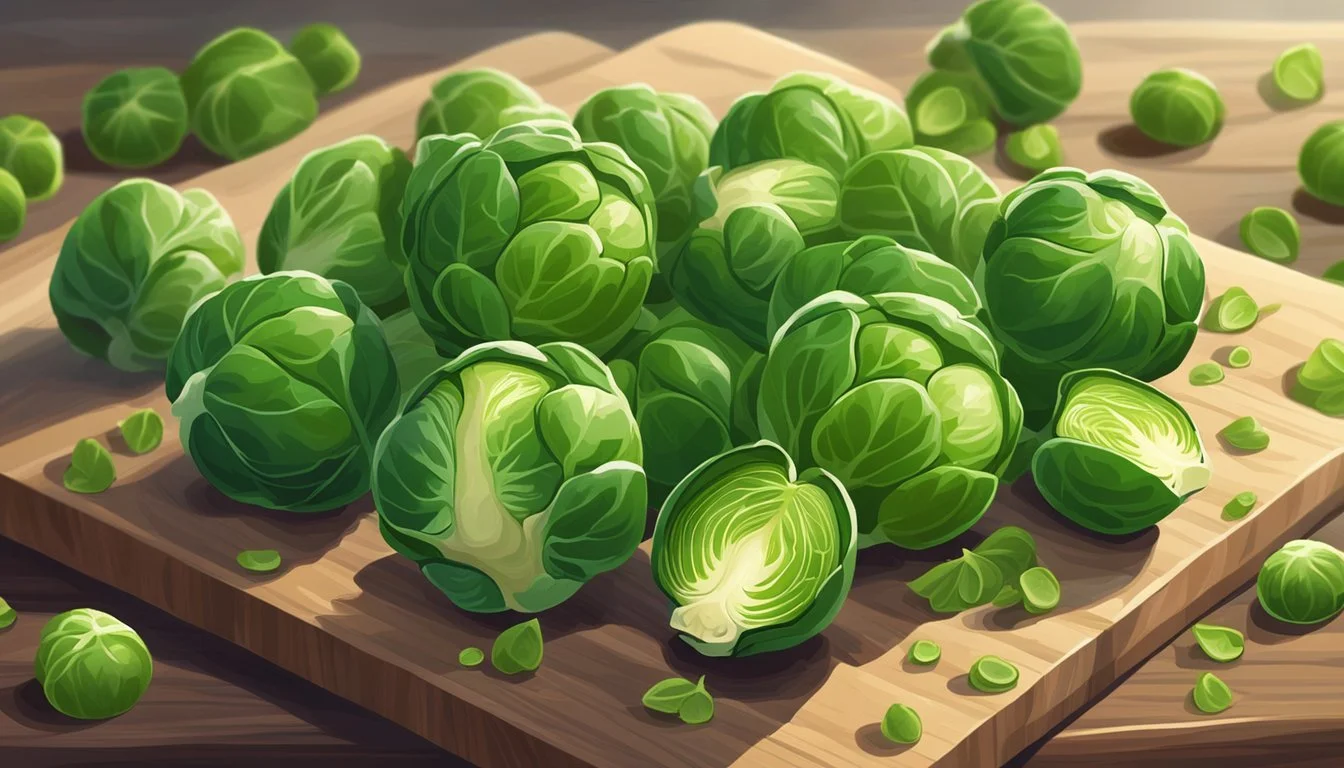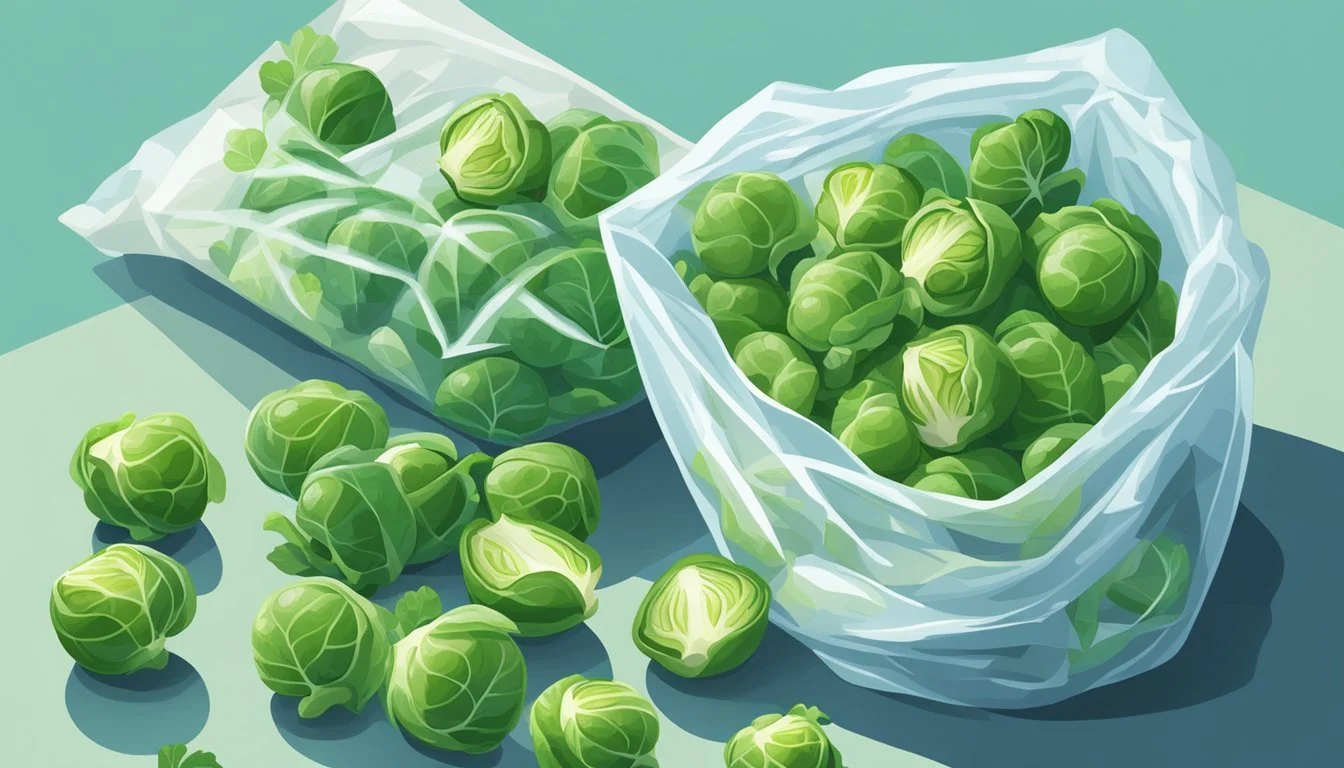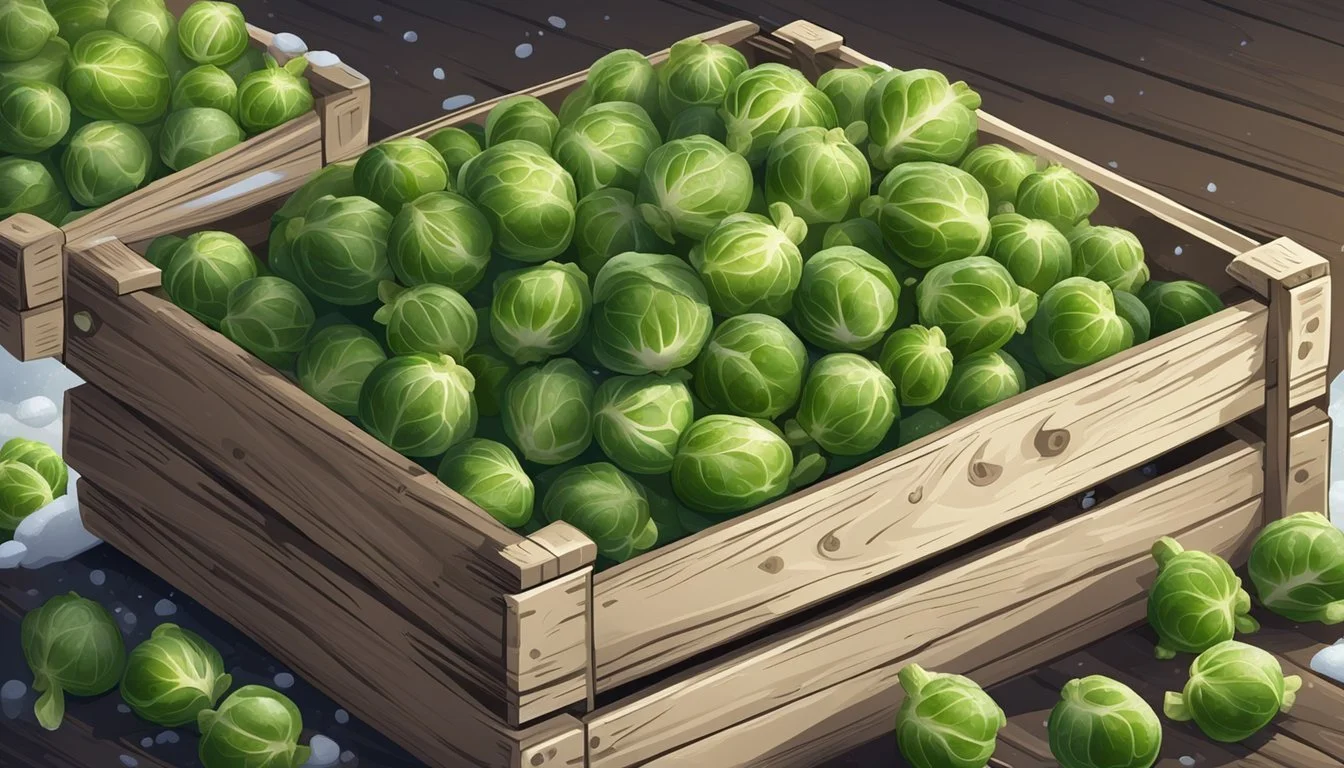Fresh vs. Frozen Brussels Sprouts: Which Packs More Nutrients and Flavor?
Brussels sprouts, those little green orbs of nutrition, have become a staple in many kitchens. The debate between fresh and frozen Brussels sprouts often leaves shoppers pondering which option to choose. Both varieties offer unique benefits and can be excellent additions to a healthy diet.
Fresh Brussels sprouts provide that satisfying crunch and vibrant flavor straight from the garden. They're ideal for roasting, sautéing, or shredding raw into salads. Fresh and frozen Brussels sprouts are nutritionally similar, with both options retaining their high vitamin C, vitamin K, and folate content. Frozen sprouts offer convenience and a longer shelf life, making them a practical choice for busy households or those who don't frequently shop for produce.
The choice between fresh and frozen ultimately depends on personal preference, cooking method, and availability. Fresh sprouts shine in recipes that highlight their texture, while frozen ones work well in cooked dishes like soups and stews. Regardless of the form, Brussels sprouts pack a nutritional punch, offering fiber, antioxidants, and potential health benefits such as improved heart health and reduced inflammation.
Understanding Brussels Sprouts
Brussels sprouts are nutrient-dense cruciferous vegetables packed with fiber, vitamins, and minerals. These small, cabbage-like veggies offer numerous health benefits and can be prepared in various ways.
History and Background
Brussels sprouts originated in ancient Rome and were later cultivated in Belgium near Brussels, giving them their name. They gained popularity in Europe during the 16th century and spread to North America in the 18th century.
These miniature cabbages grow on long stalks and are typically harvested in the fall and winter months. Brussels sprouts belong to the Brassica family, which includes broccoli, cauliflower, and kale.
Brussels sprouts have a slightly bitter taste when raw but develop a nutty, sweet flavor when cooked properly. They can be roasted, steamed, sautéed, or even eaten raw in salads.
Nutritional Profile
Brussels sprouts are nutritional powerhouses. They are low in calories but high in fiber, vitamins, and minerals. A 100-gram serving contains:
Calories: 43
Fiber: 3.8 g
Vitamin C: 85 mg (142% DV)
Vitamin K: 177 μg (148% DV)
Folate: 61 μg (15% DV)
Brussels sprouts are rich in antioxidants and phytochemicals, including sulforaphane and glucosinolates. These compounds have anti-inflammatory and potential cancer-fighting properties.
The high fiber content aids digestion and promotes feelings of fullness. Brussels sprouts also provide small amounts of iron, potassium, and calcium.
Fresh Brussels Sprouts: A Profiles
Fresh Brussels sprouts offer a unique culinary experience with distinct characteristics. These miniature cabbage-like vegetables provide a wealth of nutrients and versatility in the kitchen.
Seasonality and Availability
Brussels sprouts thrive in cool weather, typically peaking in fall and winter. They're generally available from September through March in most regions. Some grocery stores stock them year-round, but the best quality and flavor come during their peak season.
Farmers' markets often showcase locally grown Brussels sprouts during autumn months. Look for firm, compact sprouts with bright green leaves. Smaller sprouts tend to be sweeter and more tender.
Flavor and Texture
Fresh Brussels sprouts have a nutty, slightly sweet flavor with a hint of bitterness. Their taste intensifies when cooked, developing a caramelized note when roasted or sautéed.
Texture-wise, raw sprouts are crisp and crunchy. Cooking softens them, creating a tender interior while maintaining a slight bite on the outside. Overcooking can lead to a mushy texture and strong sulfurous odor, so careful preparation is key.
Cooking methods greatly influence flavor. Roasting brings out sweetness, while steaming preserves the fresh, green taste.
Proper Storage Methods
To maintain freshness, store unwashed Brussels sprouts in a plastic bag in the refrigerator's crisper drawer. They typically last 3-5 days when stored properly.
Remove any discolored outer leaves before storing. Avoid washing until ready to use, as excess moisture promotes spoilage.
For longer storage, blanch and freeze Brussels sprouts. This method preserves nutrients and allows enjoyment beyond the peak season.
Proper storage helps retain the sprouts' nutritional value, including high levels of vitamin C, vitamin K, and fiber.
Frozen Brussels Sprouts: A Profile
Frozen Brussels sprouts offer convenience and extended shelf life while retaining much of their nutritional value. They provide a practical option for enjoying this vegetable year-round.
Freezing Process and Impact on Nutrition
Frozen Brussels sprouts are harvested at peak ripeness and quickly flash-frozen to preserve their nutrients. This rapid freezing helps maintain vitamins and minerals, with minimal nutrient loss compared to fresh sprouts.
The freezing process involves blanching the sprouts briefly before freezing. This step halts enzyme activity that can cause flavor and color changes during storage.
Frozen Brussels sprouts retain most of their vitamin C, fiber, and antioxidants. Some studies suggest they may have slightly higher nutrient levels than fresh sprouts stored for extended periods.
Flavor and Texture Considerations
Frozen Brussels sprouts can have a softer texture than fresh ones due to ice crystal formation during freezing. This can affect their crispness when cooked.
The flavor of frozen sprouts is generally comparable to fresh, especially when used in cooked dishes. Any slight flavor differences are often unnoticeable in recipes with other ingredients.
Frozen sprouts may release more water during cooking. This can be managed by adjusting cooking methods or draining excess liquid before serving.
Cooking with Frozen Brussels Sprouts
Frozen Brussels sprouts are versatile and can be used in various cooking methods. They don't require thawing before cooking, saving time in meal preparation.
Roasting: Preheat oven to 400°F (200°C). Toss frozen sprouts with oil and seasonings. Roast for 25-30 minutes, stirring halfway through.
Air frying: Cook at 375°F (190°C) for 15-20 minutes, shaking the basket occasionally for even browning.
Sautéing: Cook frozen sprouts in a pan over medium-high heat with oil until crispy and heated through.
Frozen Brussels sprouts work well in casseroles, stir-fries, and soups. They can be seasoned and prepared similarly to fresh sprouts in most recipes.
Comparative Analysis
Fresh and frozen Brussels sprouts each offer unique advantages and drawbacks. This analysis examines their nutritional content, culinary applications, convenience factors, and cost-effectiveness to help consumers make informed choices.
Nutrition: Fresh vs Frozen
Fresh Brussels sprouts generally contain slightly higher levels of vitamin C and folate compared to their frozen counterparts. However, frozen Brussels sprouts often retain more nutrients overall due to the quick freezing process that halts enzymatic degradation. Frozen sprouts typically maintain their vitamin A, vitamin E, and mineral content better during storage.
Nutrient retention in fresh Brussels sprouts decreases over time, especially if not stored properly. Frozen sprouts, when stored correctly, can maintain their nutritional value for several months.
Both fresh and frozen options provide fiber, antioxidants, and beneficial plant compounds. The nutritional differences are minimal, making both choices healthy additions to a balanced diet.
Culinary Uses: Flavor and Texture
Fresh Brussels sprouts offer a crisp texture and slightly sweeter flavor when cooked properly. They're ideal for roasting, sautéing, or shredding raw in salads. Fresh sprouts allow for more control over cooking time and texture.
Frozen Brussels sprouts can be slightly softer when cooked but still maintain a good flavor profile. They're particularly useful in soups, stews, and casseroles. Frozen sprouts are pre-blanched, which can reduce cooking time.
Texture comparison:
Fresh: Crisp, firm
Frozen: Softer, but still maintains structure
Both types work well in various recipes, from simple side dishes to complex main courses. The choice often depends on the specific cooking method and desired end result.
Convenience and Accessibility
Frozen Brussels sprouts offer unparalleled convenience. They're pre-washed, trimmed, and ready to use, saving preparation time. With a long shelf life, they're always available in your freezer.
Fresh Brussels sprouts require more prep work, including washing and trimming. They have a shorter shelf life, typically lasting 1-2 weeks when refrigerated properly.
Accessibility varies:
Fresh: Seasonal availability, may be limited
Frozen: Year-round availability
For busy households or those with limited access to fresh produce, frozen Brussels sprouts provide a practical solution without sacrificing nutritional benefits.
Cost Effectiveness
Fresh Brussels sprouts can be more cost-effective when in season and purchased locally. However, prices fluctuate based on seasonality and availability.
Frozen Brussels sprouts often offer consistent pricing throughout the year. They also reduce food waste as you can use only what you need and return the rest to the freezer.
Price comparison (average):
Fresh: $2-$4 per pound
Frozen: $1.50-$3 per pound
When considering cost, factor in potential waste from trimming fresh sprouts. Frozen sprouts have already been trimmed, providing more edible product per pound purchased.
Culinary Applications
Brussels sprouts offer versatility in the kitchen, lending themselves to various cooking methods and flavor combinations. Their distinct taste and texture make them suitable for both simple and complex culinary creations.
Simple Preparations
Roasting is a popular and easy way to prepare Brussels sprouts. Trim and halve the sprouts, toss with olive oil, salt, and pepper, then roast at 400°F for 25-30 minutes. This method brings out their nutty flavor and creates a crispy exterior.
Steaming is another quick option. Place whole or halved sprouts in a steamer basket over boiling water for 5-7 minutes. This preserves their nutritional value and bright green color.
For a raw preparation, shave Brussels sprouts thinly and use them in salads. Toss with a lemon vinaigrette, add Parmesan cheese, and top with toasted nuts for a refreshing side dish.
Advanced Cooking Techniques
Sautéing Brussels sprouts allows for more complex flavor development. Heat olive oil in a pan, add halved sprouts cut-side down, and cook until golden brown. Add minced garlic and finish with a splash of balsamic vinegar.
Grilling imparts a smoky flavor to Brussels sprouts. Skewer whole sprouts, brush with oil, and grill for 8-10 minutes, turning occasionally.
For a unique twist, try deep-frying. Separate the leaves, dip in batter, and fry until crispy. Serve as a crunchy appetizer with a dipping sauce.
Pairings and Flavor Enhancers
Brussels sprouts pair well with savory and sweet flavors. Bacon or pancetta adds a salty, smoky element. Drizzle honey or maple syrup for sweetness that balances their slight bitterness.
Nuts like pecans or almonds provide textural contrast. Dried cranberries or pomegranate seeds offer bursts of tartness.
Herbs such as thyme or rosemary complement the earthy taste of Brussels sprouts. Spices like cumin or smoked paprika add depth to roasted sprouts.
Cheese is an excellent flavor enhancer. Grate Parmesan over roasted sprouts or crumble blue cheese into a Brussels sprout salad for a tangy kick.
Health Benefits and Considerations
Brussels sprouts offer numerous nutritional advantages and potential health impacts. Their nutrient profile supports overall wellness, but certain factors should be considered when incorporating them into one's diet.
Supporting a Balanced Diet
Brussels sprouts are nutrient-dense vegetables that contribute to a well-rounded diet. They are low in calories yet high in essential vitamins and minerals.
These cruciferous vegetables are particularly rich in vitamin C, providing about 85% of the daily value in just half a cup. Vitamin C supports immune function and acts as a powerful antioxidant.
Brussels sprouts also contain significant amounts of vitamin K, crucial for bone health and blood clotting. A half-cup serving offers approximately 132% of the daily recommended intake.
Fiber is another key component, with 2 grams per half-cup serving. This aids in digestion and promotes feelings of fullness, potentially supporting healthy weight management.
Potential Health Impacts
Research suggests Brussels sprouts may offer protection against certain diseases due to their high antioxidant content.
These vegetables contain compounds that may help reduce inflammation in the body. Chronic inflammation is linked to various health issues, including heart disease and certain cancers.
Brussels sprouts are rich in folate, providing about 14% of the daily value per serving. Folate is essential for DNA synthesis and cell division, making it particularly important during pregnancy.
The fiber in Brussels sprouts supports digestive health by promoting regular bowel movements and feeding beneficial gut bacteria.
Dietary Restrictions and Allergies
While Brussels sprouts are generally safe for most people, some considerations should be noted.
Individuals taking blood-thinning medications should consult their healthcare provider before significantly increasing their Brussels sprouts intake due to the high vitamin K content.
Those with thyroid issues may need to moderate their consumption of cruciferous vegetables, as they contain goitrogens that can interfere with thyroid function when consumed in large amounts.
Brussels sprouts are naturally low in sodium and saturated fat, making them suitable for many heart-healthy diets. However, preparation methods can impact their nutritional profile.
Purchase and Selection Tips
Selecting the right Brussels sprouts, whether fresh or frozen, ensures you get the best flavor and nutritional value. Quality sprouts make a significant difference in your culinary creations.
Choosing the Best Fresh Brussels Sprouts
Look for bright green, compact heads when buying fresh Brussels sprouts. Avoid those with yellowing leaves, black spots, or loose leaves. Smaller sprouts tend to be sweeter and more tender. Choose sprouts of similar size to ensure even cooking.
Fresh Brussels sprouts should feel firm when gently squeezed. If possible, buy them still attached to the stalk for optimal freshness. Peak season for Brussels sprouts is from late fall to early spring, so they're often fresher and more affordable during this time.
Store fresh sprouts in a perforated plastic bag in the crisper drawer of your refrigerator. Use them within 3-5 days for the best quality and taste.
Selecting the Best Frozen Options
Frozen Brussels sprouts offer convenience and year-round availability. Choose packages with no visible ice crystals, which can indicate freezer burn. Check the expiration date and select bags with the longest shelf life.
Look for frozen Brussels sprouts that are whole or halved, depending on your preference and intended use. Avoid packages with clumped-together sprouts, as this may indicate they've thawed and refrozen.
Some frozen Brussels sprouts come pre-seasoned or with added sauces. While these can be convenient, plain frozen sprouts offer more versatility in cooking and seasoning options.
Store frozen Brussels sprouts in the freezer at 0°F (-18°C) or below. They can last up to 12 months when stored properly.
Environmental Impact and Sustainability
The environmental footprint of Brussels sprouts varies depending on production methods and distribution. Both fresh and frozen options have distinct impacts on sustainability throughout their lifecycle.
Agricultural Practices
Conventional Brussels sprout farming often relies on synthetic fertilizers and pesticides. These chemicals can lead to soil degradation and water pollution. Non-organic methods may also harm beneficial insects and wildlife in the surrounding ecosystem.
Organic Brussels sprout production aims to minimize these negative effects. It uses natural pest control and fertilization techniques that support soil health. However, organic yields are typically lower, potentially requiring more land use.
Crop rotation and integrated pest management can reduce environmental impacts in both organic and conventional systems. These practices help maintain soil fertility and decrease reliance on chemical inputs.
Carbon Footprint of Frozen vs Fresh
Fresh Brussels sprouts have a lower carbon footprint when consumed locally and in-season. Short transportation distances and minimal processing result in fewer emissions. However, out-of-season fresh sprouts shipped long distances can have a significant carbon impact.
Frozen Brussels sprouts require energy-intensive processing and constant refrigeration. This increases their carbon footprint initially. The freezing process locks in nutrients, potentially reducing food waste. Frozen sprouts can be stored longer, allowing for more efficient transportation in bulk.
The environmental impact of frozen vs fresh ultimately depends on factors like transportation distance, storage time, and consumption patterns. Frozen options may be more sustainable when fresh alternatives are out of season or require long-distance shipping.









